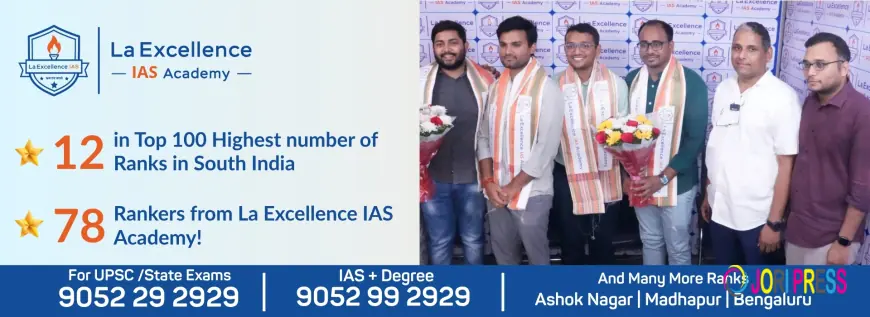Why Perfectionism is Harmful to Your UPSC Prep — And What to Do Instead
Why Perfectionism is Harmful to Your UPSC Prep — And What to Do Instead

In the journey of UPSC preparation, this quote hits harder than ever. The Civil Services Examination—known as the Mother of All Exams—demands consistency, not flawlessness. Yet, many aspirants fall into the trap of perfectionism, mistaking it for dedication. In truth, perfectionism silently destroys momentum, confidence, and even the joy of learning.
This article by La Excellence IAS Academy, the best IAS coaching in Hyderabad, explores how perfectionism creeps into UPSC prep, why it’s counterproductive, and practical ways to overcome it.
What Does Perfectionism Look Like in UPSC Preparation?
Many aspirants believe they’re being diligent when they’re actually being perfectionists. Here’s how it often shows up:
-
Spending weeks on one topic. For instance, students re-read Laxmikanth’s Polity—especially Fundamental Rights—again and again, hoping for “complete mastery.” The truth? Conceptual clarity evolves from repeated imperfections and corrections, not endless reading.
-
Delaying answer writing. Many aspirants compare their writing with toppers’ copies and wait until they can “write perfect answers.” But perfect answers come after hundreds of imperfect ones.
-
Avoiding tests. Some suffer from what we call FOND Syndrome—the Fear of Not Doing. They skip mocks fearing bad performance, ultimately losing precious practice time.
-
Collecting infinite material. UPSC is conceptual and dynamic—no single book covers it all. The more PDFs and notes you hoard, the less you retain.
-
Constant comparison. Every aspirant’s journey is unique. Comparing your routine or ranks with others leads to anxiety, not improvement.
If this sounds familiar, you’re not alone. As La Excellence mentors remind aspirants:
“UPSC success doesn’t come from being perfect—it comes from being persistent.”
Why Perfectionism is Harmful (Backed by Research & Real Experience)
1. It Causes Decision Paralysis
Perfectionism often leads to analysis paralysis—overthinking until you can’t act.
In a vast exam like UPSC, chasing completeness is impossible. Even toppers barely score 50% in Mains. The Journal of Behavioral Decision Making (2016) found that perfectionists experience greater indecision and lower performance under pressure.
So, stop waiting for the “perfect time” to start writing or revising—start now.
2. It Enhances Anxiety and Burnout
Perfectionists set unrealistic standards and criticize themselves for minor mistakes. This pattern leads to chronic stress, burnout, and low self-esteem.
A 2017 study in the Clinical Psychology Review linked perfectionism to increased anxiety and depression—especially in competitive exams.
Remember: sustainable preparation comes from discipline, not self-punishment.
3. It Hinders Prioritization and Creativity
UPSC rewards smart selection and synthesis, not encyclopedic knowledge.
Perfectionists struggle to distinguish between what’s important and what’s optional, wasting time on diminishing returns.
As IAS Tina Dabi (AIR 1, 2015) said,
“You don’t need to know everything—you need to know what matters for the exam.”
4. It Delays Answer Writing and Test Practice
Many aspirants keep postponing test series, convinced they’re not “ready.” But growth in UPSC comes through feedback, not isolation.
Anudeep Durishetty (AIR 1, 2017) once wrote:
“Your first answer will always be bad. Get it out of the way quickly.”
Each test helps refine your structure, speed, and confidence—imperfections are part of the process.
Breaking Free from Perfectionism — La Excellence’s Proven Strategies
Our mentors at La Excellence IAS Academy recommend these tested methods to overcome perfectionism and build lasting progress:
1. Shift from Perfection to Progress
Replace the pursuit of “perfect preparation” with steady progress.
Set daily achievable targets:
-
Read one topic
-
Write one answer
-
Revise one subject
Use time-boxing tools like the Pomodoro technique (25-minute focused intervals) to stay productive and prevent overthinking.
2. Accept Imperfection as Growth
Start answer writing even when you feel unprepared. Your early drafts will teach you more than passive reading ever can.
Join test series for Prelims and Mains, and treat low scores as data for improvement, not as judgments on your ability.
3. Adopt a ‘Good Enough’ Resource Strategy
Stick to one reliable book per subject:
-
Laxmikanth for Polity
-
Spectrum for Modern History
-
Shankar IAS for Environment
Add one newspaper (The Hindu / Indian Express) and a monthly current affairs magazine.
Revisit, revise, and refine—don’t chase infinite PDFs or topper notes.
4. Learn to Prioritize
Categorize topics as:
-
High Importance: Economy, Polity, Environment
-
Medium Importance: Ethics, Governance
-
Low Importance: Rarely asked peripheral topics
Devote 70% of your effort to high-weight areas. The more you practice, the more intuitive prioritization becomes.
5. Practice Emotional Detachment
UPSC is an exam—not your identity. Detach emotionally from outcomes.
Sai Chaitanya Jadhav (AIR 68, 2024) beautifully said:
“Your preparation should be intense, but your attachment to results should be minimal.”
This echoes the Nishkama Karma philosophy—focus on effort, not the fruits.
Conclusion: Progress > Perfection
UPSC doesn’t reward the one who studies the most; it rewards the one who performs the best under pressure.
Perfectionism kills spontaneity, while progress builds confidence. So, the next time you catch yourself obsessing over “perfect notes” or “flawless answers,” remind yourself:
-
Better to do than to be perfect.
-
Better to revise once than to read never.
-
Better an average answer written than a perfect one left blank.
Embrace imperfection as your teacher. That’s how toppers are made.
? For Personalized Mentorship
If you feel stuck or anxious about your preparation, reach out to our mentors at La Excellence IAS Academy, Hyderabad. They can guide you on how to overcome psychological barriers like perfectionism and build practical, structured strategies for UPSC 2025–26.
? 72079 55035 | ☎️ 90529 29299
?️ La Excellence IAS, Ashok Nagar, Hyderabad
For more expert tips, check out:
What's Your Reaction?
 Like
0
Like
0
 Dislike
0
Dislike
0
 Love
0
Love
0
 Funny
0
Funny
0
 Angry
0
Angry
0
 Sad
0
Sad
0
 Wow
0
Wow
0

















































